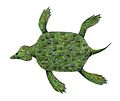Ogmodirus
| Ogmodirus Temporal range: Late Cretaceous,
| |
|---|---|

| |
| Paddle bone of KUVP 441 | |
| Cervical series of KUVP 441 | |
| Scientific classification | |
| Kingdom: | |
| Phylum: | |
| Class: | |
| Order: | |
| Suborder: | |
| Family: | |
| Genus: | †Ogmodirus |
| Binomial name | |
| †Ogmodirus martini Williston & Moodie, 1913
| |
| Synonyms | |
| |
Ogmodirus is an extinct genus of plesiosaur found in the Cenomanian-Turonian (Late Cretaceous) Greenhorn Limestone of Kansas.[1][2] The type species, O. martini, was named by Samuel Wendell Williston and Roy Lee Moodie in 1913.[2]
Discovery and naming
[edit]The holotype, KUVP 441, consists of a pelvic girdle, limb elements, and more than fifty cervical (neck) vertebrae from a juvenile discovered in Cloud County, Kansas by C. Boyce in 1909.[2] KUVP 441 was named as Ogmodirus martini by Williston & Moodie (1913)[2] and the specific name was emended to martinii by Moodie (1916), but the original name takes precedence.[3] The holotype was described in detail by Williston & Moodie (1917).[3]
A second species, Ogmodirus ischiadicus (based on specimen KUVP 434), was initially placed within its own genus, Thalassiosaurus,[3] and has since been referred to Styxosaurus.[4] It was placed in Ogmodirus by Williston & Moodie (1917).[3]
Classification
[edit]According to Welles (1962),[5] Ogmodirus martini may be member of the Elasmosauridae, a group of marine animals related to Elasmosaurus, but the condition of the fossils discovered to date means the genus is dubious beyond Plesiosauria. Sepkoski (2002) assigned Ogmodirus to the Plesiosauria.[6]
See also
[edit]References
[edit]- ^ Ogmodirus martini from Oceans of Kansas
- ^ a b c d Williston, S. W. and Moodie, R. L. (1913). New plesiosaurian genus from the Cretaceous of Nebraska. Bulletin of the Geological Society of America 24: 120-121.
- ^ a b c d S. W. Williston and R. L. Moodie. (1917). Ogmodirus martinii, a new plesiosaur from the Cretaceous of Wyoming. The University of Kansas Science Bulletin 10(2):61-73
- ^ S. W. Williston. (1903). North American plesiosaurs, part 1. Geological Series Field Museum of Natural History 3(1):1-77
- ^ S. P. Welles. (1962). A new species of elasmosaur from the Aptian of Colombia and a review of the Cretaceous plesiosaurs. University of California Publications in Geological Sciences 44(1):1-96
- ^ Sepkoski, J.J. (2002). A compendium of fossil marine animal genera. Bulletins of American Paleontology 363:1-560.







